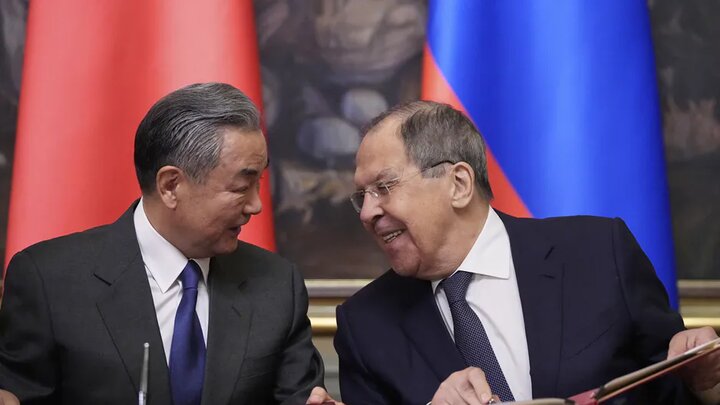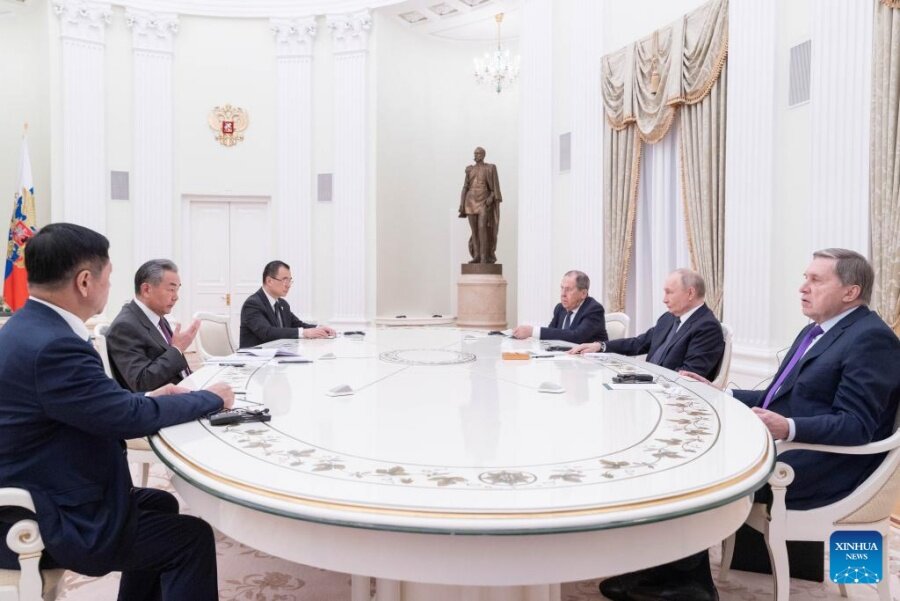Beijing – Foreign Minister Wang Yi’s three-day trip to Russia highlights China’s involvement in promoting world peace and stability, particularly regarding the resolution of Russia-crane conflicts.
China’s foreign minister officially visited Russia for three days from Monday to Wednesday, where he held a series of top-level meetings with Russian officials, including President Vladimir Putin and Foreign Minister Sergei Lavrov.
During a meeting with Putin at the Kremlin on Tuesday, the king said China and Russia were working to advance multilateralism and democratize international relations. He added that both countries will strengthen the UN’s central role in the global system.
Wang emphasized that the Beijing Moscow collaboration “does not target third parties,” and that it remains impermeable to external interference.
Putin said he would meet President Xi Jinping at a World War II victory celebration held in Moscow on May 9th.
“We have the opportunity to discuss the current state of bilateral relations and our interactions mainly on the UN Security Council-Shanghai Cooperation Agency, BRICS and many other platforms we have been working with incredibly successful,” the Russian president said.

Foreign Ministers of China and Russia have focused on “the need to neutralize the root causes of the Ukrainian conflict.”
Chinese diplomats further discussed the conflict in Ukraine with their Russian counterparts and the need for a lasting peace agreement.
“The side exchanged opinions on the prospect of resolving the Ukraine crisis. They emphasized the need to neutralize the root cause of the conflict,” according to the Russian Foreign Ministry.
The ministry added, “The Minister touched on the issues of individual regions related to the situation on the Korean Peninsula, the Iranian nuclear program and the situation in Central Asia.”
In an exclusive interview with Russia in Moscow today, Wang praised the new modern model of a new model that was “non-aligned, non-conflicted, and not targeting third parties.” He told the Russian news channel that the model is also a key force in the stability of a turbulent, changing world.
China’s initiative to address Ukraine’s conflict reflects multilateralism and commitment to global stability.
“Europe is not on the negotiation table (beyond the Ukrainian conflict), and is often ignored and even stabbed by the US side,” Shen Shiwei told the Tehran Times. In particular, in 2023, China helped to promote a reconciliation between Iran and Saudi Arabia. In July 2024, a Chinese-mediated contract was signed in Beijing between Hamas and Fatah, with the aim of resolving their disputes. Representatives of these Palestinian factions engaged in discussions with the King after reconciliation discussions involving many other Palestinian groups.
As a representative of the Tehran era here in China’s capital, I reached out to Shen Siwei, a researcher and expert in international relations based in Beijing, to gain a perspective on the potential impact of the King’s visit to Russia on the resolution of the Ukrainian conflict.
“China welcomes and supports all peace efforts, including US-Russia consultations. As Chinese Foreign Minister Wang Yi repeatedly said, China is ready to play a ‘constructive role’ in solving the war in Ukraine when he was interviewed by RT during his visit in Russia. I said.
I asked whether China could take on an equally crucial role in resolving the Russian-Ukurein conflict, similar to its critical involvement in promoting Iran-Saudi reconciliation.
“The situation is different. A security framework, including European countries, is a necessary choice to end the Russian-Ukurein conflict. But so far, we have found that Europe has not been on the negotiation table, often ignored and stabbed by the US side.
He also sought his views on how China’s policy will affect its approach to various international issues, particularly issues relating to Iran’s nuclear program.
“We know that the Trump administration is increasing pressure on Tehran on Iran’s nuclear issue. We have been able to return to the joint China, Russia and Iranian statement on Iran’s nuclear deal issued on March 14. Right, as a signator to the treaty on the non-proliferation of nuclear weapons, we are on the peaceful use of nuclear energy,” Shen said.
China’s Foreign Minister hosted Foreign Minister Kazem Galibabadi, Minister of Foreign Affairs Sergei Riabakov, Deputy Foreign Minister of Iran, at the Diayotai Province Guesthouse in Beijing on March 14, 2025. The talks focused on Iran’s nuclear program.
That day, Vice Minister of China, Ma Chaoks, held talks with the vice ministers of Iran and Russia at the same location. At the end of the meeting, a joint statement was issued emphasizing the “necessity for full respect for Iran’s right to peaceful use of nuclear energy as the NPT party.”
Trump recently threatened to bomb Iran unless Tehran reaches an agreement with Washington about nuclear activity. Iran describes Trump’s threat as a “humiliation” of global peace and security, a violation of the UN Charter and a betrayal of security measures under the International Atomic Energy Agency (IAEA).

